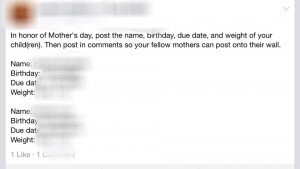I posted to Facebook and you would never guess what happened next.
Categories: Information Security
Most of us have some type of social media account, be it Facebook, Pintrest, Snapchat, or whatever the newest social media craze is. Social media has changed how we interact and get information. You can “like” a news outlet page, “befriend” a celebrity, or even “follow” a fictional character. Social media has become a way for companies to advertise and invest in markets they couldn’t reach before. It has given us a way to connect with people in more ways than ever before. As an example, I know what my I know what my high school friends are doing ten years after graduating without seeing or talking to them in person. However, with the “advent” of these connections, risks also appear. While information we post can be harmless, it can lead to unintended consequences. The second weekend in May, I saw three different stories that will make you think about what you should post on these social networks.
Fish in the Road
The first post I want to mention was written by a friend from college. From May 6th to May 8th Central Oklahoma received a lot of rain that led to flash flooding of some ponds, rivers, creeks, and streets. While driving through one of the flooded streets, he noticed a fish swimming and decided to film it. He uploaded the video to his Facebook. About a day later he noticed that the video had over 5K views and growing. His post had gone viral. As you can guess, the majority of people who are seeing his video, liking it, and sharing it do not even have a 1st or 2nd degree of connection.
While this post was just of a fish swimming in the road, think of the impact that it could have IF it was an embarrassing video?
Facebook Chain Message
The second post is very similar to what we see on Facebook today; The “Share if you remember”, “1 Like= 1 Prayer”, “Re-post this in your status” type of posts. While some off these are just fun little “trips down memory lane”, political statements and little games, they can be used as an attack vector for malware delivery, clickjacking and phishing/pharming. I saw an example of this on May 9th. The City of Norman’s Police Department posted on their Facebook page about a post in honor of Mother’s Day.

It asked you to list details about your children. While most of this information is harmless (and freely available given enough time,) by posting it on your Facebook page you have now made it even easier to obtain. Levi covered why this particular post is a security concern earlier this month. Posts like these are gold mines for scammers and they appear constantly.
A side note, “liking” and “sharing” posts can actually effect what appears on your newsfeed. Facebook uses an algorithm to determine what you see. When you like and share posts, it will adjust so you see more of them. To learn more about it, you can check out this post.
Internet Vigilantism or Digilantism
This story is what really prompted my thoughts behind this post. On May 11th, I read a story not on Facebook, but on NakedSecurity, an internet security blog. The story comes from Melbourne, Australia and happened earlier that week. An older man stopped to take a selfie in front of a Darth Vader cutout. A mother who had her kids nearby thought he was taking a picture of her kids and instead of confronting him about it, she took a picture of him and reported him to the local authorities. She then went on Facebook, posted her picture of him and proceeded to call him a creep. Within a day, he had received death threats and his reputation was dragged through the mud. This type of story is becoming more common every day. Social Media (and the Internet in general) has given voices to the masses and in many cases has allowed the voices to be anonymous. This isn’t the first time something like this has happened, and it won’t be the last.
These are just three examples of MANY things I can post that show how easy it is to share information (or misinformation) on social networks and how they can quickly turn bad. We use social media as a public soapbox, a place to air our grievances and shout our triumphs. We share inspirational stories and pictures as well as our defeats with our friends and family. Most of the time, this information is harmless, but like they say “It’s all fun and games until someone get hurt.” So with that in mind, here are a few things to remember when it comes to posting on social media.
- Check your privacy settings and check them often. A lot of social media sites are constantly changing their settings. It should become an annual habit of verifying your privacy/security settings to make sure only what you want to get out, gets out and to the proper people.
- Do not post anything that you are not ready for the rest of the world to know.
- Do not post intimate details. Contrary to what some people believe, MOST of us do not want to know how your colonoscopy went or your bedroom escapades.
- Lastly, be prepared to deal with the consequences of your actions. Free speech does not mean freedom from consequences. Like this guy, and this guy, and this lady, or this guy.
Remember, once something is out on the internet, it is hard to remove. There is no “Clean Slate” program like what was mentioned in The Dark Knight Rises. Think before you post! If you have any questions or concerns, feel free to contact your extension support specialist.